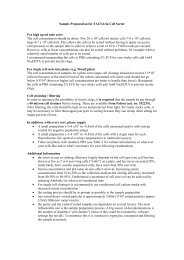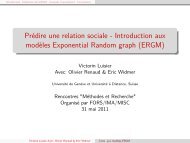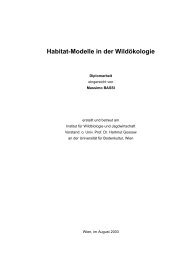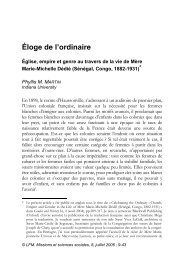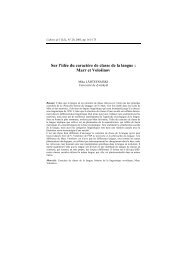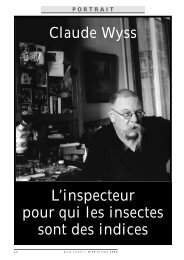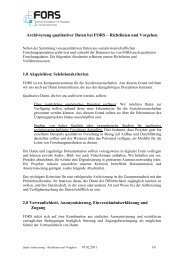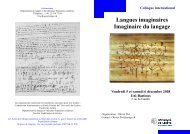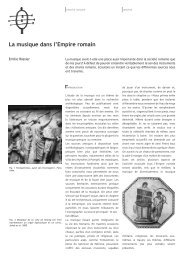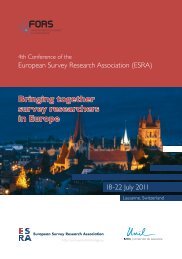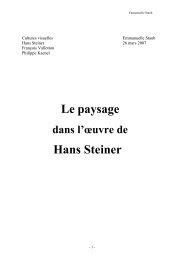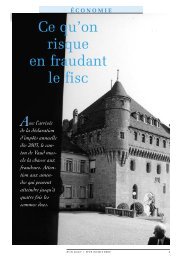The Critical Horizon of Jakobson's Work and its Multidisciplinarity
The Critical Horizon of Jakobson's Work and its Multidisciplinarity
The Critical Horizon of Jakobson's Work and its Multidisciplinarity
You also want an ePaper? Increase the reach of your titles
YUMPU automatically turns print PDFs into web optimized ePapers that Google loves.
Cahiers de l’ILSL, N° 9, 1997, pp. 187-198<br />
<strong>The</strong> <strong>Critical</strong> <strong>Horizon</strong> <strong>of</strong> <strong>Jakobson's</strong> <strong>Work</strong><br />
<strong>and</strong> <strong>its</strong> <strong>Multidisciplinarity</strong><br />
Savina RAYNAUD<br />
Università cattolica del Sacro Cuore, Milan<br />
<strong>The</strong> wider, the higher a building, the deeper <strong>and</strong> more extended <strong>its</strong> foundations.<br />
Thus it is too on the spatial, geo-physical level ; <strong>and</strong> the same would<br />
seem to apply when human genius is at work.<br />
Some years ago I was studying <strong>Jakobson's</strong> semiotical thought. Naturally<br />
I read also the secondary literature on the subject, <strong>and</strong> there I got<br />
the impression <strong>of</strong> a rather recent, but diffuse feeling <strong>of</strong> intolerance directed<br />
towards him. <strong>The</strong> objection : one who is so brilliant in discussing languages,<br />
poetry, cultural avantgarde-movements <strong>and</strong> so on cannot be as rigorous<br />
as required. Perhaps, a sort <strong>of</strong> a posteriori envy against such an outsider,<br />
a non-st<strong>and</strong>ard character. Anyway an interesting question arose :<br />
what about <strong>Jakobson's</strong> care <strong>of</strong> indicating the basis <strong>of</strong> his thesis, <strong>of</strong> his<br />
scientific assertions? about his awareness <strong>of</strong> the relevance <strong>of</strong> such basis?<br />
<strong>and</strong> in any case, whether indicated or not, what is the foundation <strong>of</strong> the huge<br />
building <strong>of</strong> his scientific research?<br />
Perhaps precisely his brilliant way <strong>of</strong> proposing subjects <strong>of</strong> investigation,<br />
<strong>of</strong> communicating results <strong>of</strong> enquiry etc. suggested the title under<br />
which an answer should have been found : was he not a free spirit, a man<br />
without prejudices, a scholar not subject to any methodological or contentlinked<br />
conformism?<br />
A word suggested <strong>its</strong>elf as the target <strong>of</strong> a verification ; a word that<br />
sounded familiar to me as a programmatic expression : the husserlianVoraussetzungslosigkeit.<br />
Its relevance appeared suitable to the proposed task<br />
both for <strong>its</strong> proper epistemological meaning <strong>and</strong> for historical reasons, that<br />
is to say because <strong>of</strong> the <strong>of</strong>ten reaffirmed relation between Jakobson <strong>and</strong><br />
Husserl.<br />
My present aim will then be : first, to set out Husserl's thoughts on<br />
this «lack <strong>of</strong> presuppositions» ; second, to discover <strong>Jakobson's</strong> possible<br />
correspondence to such principle. Eventually, I shall try to evaluate the results<br />
<strong>of</strong> this comparison, whatever they may be.
188 Cahiers de l’ILSL, N° 9, 1997<br />
1. THE DEVELOPMENT OF HUSSERL'S PHENOMENOLOGY AND<br />
THE CONSTANT OBJECTIVE OF VORAUSSETZUNGSLOSIGKEIT<br />
<strong>The</strong> first relevant passage we can find in Husserl's writings is the 7th paragraph<br />
<strong>of</strong> the Introduction to the Logische Untersuchungen, placed immediately<br />
after the Prolegomena zu einer reinen Logik <strong>and</strong> before the text <strong>of</strong><br />
the six Researches ; a place which underlines the strategic role conferred<br />
on a methodological principle : Prinzip der Voraussetzungslosigkeit.<br />
In fact, the title <strong>of</strong> the paragraph restricts the field <strong>of</strong> application <strong>of</strong><br />
such principle to gnoseological researches. But a careful reading <strong>of</strong> the text<br />
extends <strong>its</strong> validity to all the sciences, which become «philosophical» after<br />
having been «ingenuous», if they apply the phenomenological theory, that<br />
is to say the theory developed according to this principle. In this way sciences<br />
<strong>of</strong>fer knowledge with all possible <strong>and</strong> desirable certainty <strong>and</strong> clarity.<br />
In the same context Husserl states :<br />
Von der reinen Erkenntnistheorie geschieden ist die Frage nach der<br />
Berichtigung, mit der wir bewusstseinstranszendente «psychische» und<br />
«physische» Realitäten annehmen. […] Die Frage nach der Existenz und Natur<br />
der «Aussenwelt» ist eine metaphysische Frage», <strong>and</strong> adds : «Die uns<br />
gesteckten Grenzen überschreiten wir nicht, wenn wir z.B. von dem Faktum<br />
der Sprachen ausgehen und die bloss kommunikative Bedeutung mancher unter<br />
ihnen Ausdrucksformen erörtern, und was dergleichen mehr. Man überzeugt<br />
sich überall mit Leichtigkeit, dass die angeknüpften Analysen ihren Sinn und<br />
erkenntnistheoretischen Wert unabhängig davon haben, ob es wirklich<br />
Sprachen und einen Wechselverkehr von Menschen, dem sie dienen wollen,<br />
gibt, ob es überhaupt so etwas wie Menschen und eine Natur gibt oder ob all<br />
das nur in der Einbildung und Möglichkeit besteht.<br />
In order to recall where these severe limitations came from, it may<br />
be useful to refer to some definitions Husserl gives <strong>of</strong> the positive task <strong>of</strong><br />
philosophy, i.e. <strong>of</strong> phenomenology. On the premise that «Alle theoretische<br />
Forschung, obschon sie sich keineswegs bloss in ausdrücklichen Akten oder<br />
gar in kompletten Aussagen bewegt, terminiert doch zuletzt in Aussagen»<br />
<strong>and</strong> that «Urteile, die der höheren intellektuellen Sphäre, insbesondere<br />
der wisssenschaftlichen, angehören, sich ohne sprachlichen Ausdruck<br />
kaum vollziehen lassen», Husserl affirms :<br />
Danach sind die Objekte, auf deren Erforschung es die reine Logik abgesehen<br />
hat, zunächst im grammatischen Gew<strong>and</strong>e gegeben. Genauer zu reden, sie sind<br />
gegeben sozusagen als Einbettungen in konkreten psychischen Erlebnissen, die<br />
in der Funktion der Bedeutungsintention oder Bedeutungserfüllung […] zu<br />
gewissen sprachlichen Ausdrücken gehören und mit ihnen eine phänomenologische<br />
Einheit bilden. Aus diesen komplexen phänomenologischen<br />
Einheiten hat der Logiker die ihn interessierenden Komponenten […]<br />
herauszuheben und sie in deskriptiver Analyse so weit zu studieren, als es zur
Raynaud : Between Voraussetzungslosigkeit… 189<br />
Förderung seiner eigentlich logischen Aufgaben vorteilhaft ist. […] Zunächst<br />
aber ist uns das Logische in einer unvollkommenen Gestalt gegeben: der<br />
Begriff als mehr oder minder schwankende Wortbedeutung, das Gesetz, weil<br />
aus Begriffen sich bauend, als nicht minder schwankende Behauptung. Zwar<br />
fehlt es darum nicht an logischen Einsichten. […] Also dieses Gegebensein der<br />
logischen Ideen und der sich mit ihnen konstituierenden reinen Gesetze kann<br />
nicht genügen. So erwächst die grosse Aufgabe, die logischen Ideen, die<br />
Begriffe und Gesetze, zu erkenntnis theoretischer Klarheit und Deutlichkeit zu<br />
bringen. Und hier setzt die phänomenologische Analyse ein. […] Wir wollen<br />
auf die ‘Sachen selbst’ zurückgehen.<br />
(Introduction to the LU, § 2)<br />
After having said that what matters is to develop «eine […] objektive[…]<br />
<strong>The</strong>orie der Erkenntnis und, was damit innigst zusammenhängt,<br />
eine reine […] Phänomenologie der Denk-und Erkenntniserlebnisse»<br />
(Introduction to the LU, §1), Husserl states :<br />
eine erkenntnistheoretische Untersuchung, die ernstlichen Anspruch auf<br />
Wissenschaftlichkeit erhebt, muss […] dem Prinzip der Voraussetzungslosigkeit<br />
genügen. Das Prinzip kann aber unseres Erachtens nicht mehr besagen<br />
wollen als den strengen Ausschluß aller Aussagen, die nicht phänomenologisch<br />
voll und ganz realisiert werden können. […] Die Erkenntnistheorie hat aber in<br />
diesem theoretischen Sinn nichts zu erklären, sie baut keine deduktiven<br />
<strong>The</strong>orien und ordnet nicht unter solche <strong>The</strong>orien. […] Mit dieser <strong>The</strong>orie der<br />
<strong>The</strong>orien liegt die sie aufklärende formale Erkenntnistheorie vor aller empirischen<br />
<strong>The</strong>orie: also vor aller erklärenden Realwissenschaft […] Sie will nicht<br />
die Erkenntnis, das faktische Ereignis in der objektiven Natur, in<br />
psychologischem oder psychophysischem Sinn erklären, sondern die Idee der<br />
Erkenntnis nach ihren konstitutiven Elemente, bzw. Gesetzen aufklären.<br />
(Introduction to the LU, §7)<br />
At least two sides <strong>of</strong> this program must be underlined : <strong>its</strong> pars<br />
construens devoted to the pure description, the mere acknowledgement <strong>of</strong><br />
what is evidently present in the consciousness ; the connected — but not<br />
preceding — pars destruens, according to which every further construction<br />
has to be avoided, every belief or interpretation which can result mixed <strong>and</strong><br />
confused with the pure data.<br />
Considering the first objective, we can better underst<strong>and</strong> it thanks to<br />
a further principle later enunciated by Husserl himself, <strong>and</strong> to a sort <strong>of</strong><br />
commentary given by Heidegger. In 1913 Husserl expresses the «principle<br />
<strong>of</strong> all principles» in this way :<br />
dass jede originär gebende Anschauung eine Rechtsquelle der Erkenntnis sei,<br />
daß alles, was sich uns in die «Intuition» originär, (sozusagen in seiner<br />
leibhaften Wirklichkeit) darbietet, einfach hinzunehmen sei, als was es sich da<br />
gibt, aber auch nur in den Schranken, in denen es sich da gibt.<br />
(Husserl 1913, I, § 24)
190 Cahiers de l’ILSL, N° 9, 1997<br />
Three years later, in 1916, Husserl was called from Göttingen to<br />
Freiburg in Breisgau. <strong>The</strong>re he met Heidegger, who became his assistant.<br />
Through their being close to each other, Heidegger could penetrate Husserl's<br />
thought :<br />
Was ist da, was die Phänomenologie ‘sehen lassen’ soll ? Was ist es, was in<br />
einem ausgezeichneten Sinne Phänomen ‘genannt werden muss?’ […] Offenbar<br />
solches, was sich zunächst und zumeist gerade nicht zeigt, was gegenüber<br />
dem, was sich zunächst und zumeist zeigt, verborgen ist, aber zugleich etwas<br />
ist, was wesenhaft zu dem, was sich zunächst und zumeist zeigt, gehört, so<br />
zwar, dass es seinem Sinn und Grund ausmacht.<br />
(Heidegger 1927, § 7. C)<br />
In the previous period <strong>of</strong> Husserl's academic life, which he spent in<br />
Göttingen from 1901 to 1916, another famous pupil <strong>of</strong> his had the opportunity<br />
<strong>of</strong> receiving a strong impression <strong>of</strong> his original methodological<br />
proposal : Edith Stein. This is her testimony :<br />
<strong>The</strong> Logische Untersuchungen had caused a great sensation especially because<br />
they appeared as a radical withdrawal away from the critical idealism <strong>of</strong><br />
kantian <strong>and</strong> neokantian stamp. A ‘new scholasticism’ was seen there, because<br />
one turned one's glance from the subject <strong>and</strong> directed it towards things: knowledge<br />
again appeared to be a ‘receiving’ which derives from things <strong>its</strong> law, <strong>and</strong><br />
not, as in criticism, a ‘determining’ which imposes <strong>its</strong> law on things.<br />
(Stein, 1979)<br />
As a matter <strong>of</strong> fact, Jakobson came in contact with Husserl in 1915,<br />
by reading in Moscow his Logische Untersuchungen. It is worth mentioning<br />
that he had obtained them through Amsterdam, because German publications<br />
in Moscow, during the first World War, were censured. Eight<br />
years later, in 1923, the new Soviet State decreed that the works <strong>of</strong> so-called<br />
idealist philosophers should be removed from all public libraries. Husserl's<br />
writings were included in the list. Apart from the considerations<br />
which can arise from the destiny repeatedly assigned to a book by opposite<br />
sources, one may be surprised, after having heard Edith Stein's evaluations,<br />
that Husserl was then considered an idealist. But this judgment is historically<br />
correct, because his thought developed in that direction.<br />
<strong>The</strong>mes like phenomenological attitude <strong>and</strong> Voraussetzungslosigkeit<br />
had to follow this transformation. But why should we give an account<br />
<strong>of</strong> these changes? Because the link between Jakobson <strong>and</strong> Husserl does not<br />
stop at the beginning <strong>of</strong> the century, at 1915. We have to wait until 1935 to<br />
find them, in Prague, one in presence <strong>of</strong> the other, better, one introducing<br />
the other to the Cercle linguistique de Prague. In november <strong>of</strong> that year<br />
Husserl was invited both by Charles University (the German <strong>and</strong> the Czech<br />
University) <strong>and</strong> by the Linguistic Circle.
Raynaud : Between Voraussetzungslosigkeit… 191<br />
<strong>The</strong> subject <strong>of</strong> Husserl's lectures, which were not recorded, anticipated<br />
what was to have been his last work — Die Krisis der europäischen<br />
Wissenschaften und die transzendentale Phänomenologie — but appeared<br />
posthumously (1954). <strong>The</strong> theme <strong>its</strong>elf <strong>and</strong> the fact that the occasion <strong>of</strong> <strong>its</strong><br />
exposition occurred almost at the end <strong>of</strong> the exchanges between our<br />
authors require an updating <strong>of</strong> the questions we are concerned with.<br />
Briefly, we will mention three further steps in Husserl's evolution:<br />
the first, in the opening lecture <strong>of</strong> the posthumously edited Die Idee der<br />
Phänomenologie. Fünf Vorlesungen [26.IV — 2.V.1907], 1950; the second<br />
in the volume Ideen zu einer reinen Phänomenologie und phänomenologische<br />
Philosophie, the last in his Krisis. <strong>The</strong> importance <strong>of</strong> the first<br />
two texts derives from the new transcendental perspective; the last one is<br />
particularly relevant for our comparison because <strong>of</strong> the explicit connection<br />
between philosophy <strong>and</strong> sciences.<br />
In Die Idee der Phänomenologie, as in the Logische Untersuchungen,<br />
we find our theme at the beginning <strong>of</strong> the exposition. <strong>The</strong> «phenomenological<br />
observation» is described on three levels. After the initial<br />
«cartesianische Zweifelsbetrachtung», through which the being <strong>of</strong> the cogitatio<br />
is placed beyond doubt, <strong>and</strong> the cogitationes are judged as the first<br />
absolute «Gegebenheiten», the first theoretical reflection on knowledge<br />
can be formulated : «Wie kann ein Sein getr<strong>of</strong>fen werden in der Erkenntnis<br />
[…] ?». «Man antwortet zunächst […] mit dem Begriffspaar Immanenz<br />
und Transzendenz». What is accepted, what is «fraglos» is the «reel Immanentes<br />
oder, was hier dasselbe besagt, adäquat Selbstgegebenes». Husserl<br />
speaks here <strong>of</strong> «Immanenz im Sinne der in der Evidenz sich konstituierenden<br />
Selbstgegebenheit», <strong>and</strong> he places it in opposition to what is transcendent,<br />
which is excluded from the phenomenological observation.<br />
«Transzendentes … darf ich nicht benützen, also ich muss phänomenologische<br />
Reduktion, Ausschluss aller transzendenten Setzungen vollziehen.»<br />
Already the cogitationes need to be phenomenologically reduced. <strong>The</strong> pure<br />
phenomenon is what is reduced, not to be confused with the psychological<br />
phenomenon in the psychological apperception <strong>and</strong> objectivation. This is<br />
the second level, which reaches a new objectivity through abstraction. On<br />
the third level Husserl places the problem <strong>of</strong> the wonder-inspiring [wunderbare]<br />
relation between phenomenon <strong>of</strong> knowledge <strong>and</strong> object <strong>of</strong> knowledge,<br />
that is to say, the problem <strong>of</strong> the constitution <strong>of</strong> objectivities <strong>of</strong> any<br />
kind in knowledge. <strong>The</strong>n he assigns to the theory <strong>of</strong> knowledge a first, critical<br />
task : that <strong>of</strong> a «critique <strong>of</strong> the natural knowledge in all the natural<br />
sciences», which sends back to the distinction between natural science <strong>and</strong><br />
philosophical science, just introduced. At the basis <strong>of</strong> natural science there<br />
is a natural spiritual attitude, «den Sachen zugew<strong>and</strong>t». In perception, for<br />
instance, a thing remains in front <strong>of</strong> our eyes. It is there in the middle <strong>of</strong> a<br />
world. To this world our judgements refer. But phenomenology involves
192 Cahiers de l’ILSL, N° 9, 1997<br />
the specific philosophical method, <strong>and</strong> «philosophy lies in a totally new<br />
dimension».<br />
In the second chapter <strong>of</strong> Ideen, devoted to the «phänomenologische<br />
Fundamentalbetrachtung» we find a better description <strong>of</strong> this «totally new<br />
dimension». While in the world <strong>of</strong> the «natürliche Einstellung» «das aktuell<br />
Wahrgenommene, das mehr oder minder klar Mitgegenwärtige und<br />
Bestimmte […] ist teils durchsetzt, teils umgeben von einem dunkelbewussten<br />
<strong>Horizon</strong>t unbestimmter Wirklichkeit.» (58), <strong>and</strong> then the general<br />
thesis <strong>of</strong> the «natürliche Einstellung» is «die Welt ist als Wirklichkeit<br />
immer da. Sie umfassender, zuverlässiger, in jeder Hinsicht vollkommener<br />
zu erkennen, als er die blosse Erfahrungskunde zu leisten vermag […], das<br />
ist das Ziel der Wissenschaften der natürlichen Einstellung. Es sind die gewöhnlich<br />
sogenannten «positiven» Wissenschaften, Wissenschaften der<br />
natürlichen Positivität» (63), in the philosophical perspective the «natural<br />
thesis» has to be radically transformed, excluded, put into brackets. Thus<br />
we arrive at the «transzendentalphänomenologische epoch». «Also alle auf<br />
diese natürliche Welt bezüglichen Wissenschaften […] schalte ich aus, ich<br />
mache von ihren Geltungen absolut keinen Gebrauch.» (68)<br />
This very relation between the sciences <strong>and</strong> transcendental phenomenology<br />
is the thematic core <strong>of</strong> Husserl's Krisis, <strong>and</strong> calls into play our<br />
specific intention <strong>of</strong> discussing <strong>Jakobson's</strong> more or less genuine consonance<br />
with Husserl's project. In his «Analytik der transzendentalen Epoché»<br />
the first step is the «Epoché von der objektiven Wissenschaft», which<br />
should lead to the method <strong>of</strong> access to the field <strong>of</strong> work <strong>of</strong> the new science<br />
[die Zugangsmethode zu dem Arbe<strong>its</strong>feld der neuartigen Wissenschaft].<br />
Vielmehr gemeint ist eine Epoché von jedem Mitvollzug der Erkenntnisse der<br />
objektiven Wissenschaften, Epoché von jeder kritischen, an ihrer Wahrheit<br />
oder Falschheit interessierten Stellungsnahme, selbst zu ihrer leitenden Idee<br />
einer objektiven Welterkenntnis.<br />
(§ 35)<br />
Again, two possibilities are described as opposed to each other :<br />
die zwei möglichen Grundweisen, die Lebenswelt thematisch zu machen: die<br />
naiv-natürliche Geradehineinstellung und die Idee einer konsequent reflexiven<br />
Einstellung auf das Wie der subjektiven Gegebenhe<strong>its</strong>weise der Lebenswelt<br />
und der lebensweltlichen Objekte.<br />
(§ 38)<br />
It is not a matter <strong>of</strong> rejecting experience as the basis <strong>of</strong> knowledge.<br />
Sagt ‘Positivismus’ soviel wie absolut vorurteilsfreie Gründung aller Wissenschaften<br />
auf das ‘Positive’, d. i. originär zu Erfassende, dann sind wir die echten<br />
Positivisten.
Raynaud : Between Voraussetzungslosigkeit… 193<br />
(Husserl 1913 § 20)<br />
But the notion <strong>of</strong> experience accepted by Husserl is much more sophisticated<br />
than the common one.<br />
Besides, in the Introduction to his sixth Logical Investigation, Husserl<br />
adm<strong>its</strong> :<br />
Die soeben geschilderten Ziele unserer Bemühungen sind nicht die letzten und<br />
höchsten einer phänomenologischen Aufklärung der Erkenntnis überhaupt. Das<br />
so überaus fruchtbare Gebiet des mittelbaren Denkens und Erkennens lassen<br />
unsere Analysen, so umfassend sie auch sind, noch fast ganz unbearbeitet; das<br />
Wesen der mittelbaren Evidenz und ihrer idealen Korrelate bleibt ohne<br />
zureichende Aufklärung.<br />
How can we expect to see this limited but so exigent methodological<br />
proposal satisfied by the effective <strong>and</strong> productive research developed<br />
by Jakobson in linguistics ?<br />
Let us go to his writings.<br />
2. JAKOBSON'S EPISTEMOLOGY AND METHODOLOGY IN<br />
WORDS AND WORKS<br />
As regards the reconstruction <strong>of</strong> the historical <strong>and</strong> theoretical relations between<br />
Jakobson <strong>and</strong> Husserl much is due to Elmar Holenstein <strong>and</strong> to other<br />
scholars. To affirm the existence <strong>of</strong> a factual <strong>and</strong> ideal nearness <strong>of</strong> Jakobson<br />
to Husserl does not imply a deep consonance <strong>of</strong> their scientific projects<br />
<strong>and</strong> realizations.<br />
Jakobson, it is true, is generous in mentioning <strong>of</strong> Husserlian themes<br />
<strong>and</strong> theses. But this does not imply, in most cases, more than a well<br />
informed agreement about fundamental approaches <strong>of</strong> research. It does not<br />
mean the precise intention <strong>of</strong> following detailed methodological indications<br />
in his own field <strong>of</strong> investigation.<br />
<strong>The</strong>re are two kinds <strong>of</strong> occasions which induce Jakobson to deal<br />
with epistemological questions ; on the one h<strong>and</strong>, the historical reconstructions<br />
<strong>of</strong> the development <strong>of</strong> linguistic sciences, <strong>and</strong> on the other, the<br />
explicit methodological justifications within — or at the beginning <strong>of</strong> —<br />
effective linguistic research, especially the phonological one, on the other<br />
h<strong>and</strong>.<br />
Jakobson reveals an extremely cultivated knowledge <strong>and</strong> a quite<br />
clear awareness <strong>of</strong> the borders <strong>of</strong> competence <strong>of</strong> the different disciplines<br />
involved.
194 Cahiers de l’ILSL, N° 9, 1997<br />
Aussi étrange que cela soit, les linguistes qui étudient le phonème sont surtout<br />
enclins à discuter son mode d'existence. Ils s'attachent ainsi à une question dont<br />
la réponse se trouve évidemment hors de la linguistique.<br />
Le problème ontologique de savoir quelle forme de réalité se cache derrière la<br />
notion de phonème ne contient véritablement rien de spécifique pour l'idée du<br />
phonème. Ce n'est qu'un cas particulier d'un problème beaucoup plus large:<br />
quel genre de réalité peut-on attribuer à toute valeur linguistique et même à<br />
toute valeur en général? […] Mais, si nous considérons toutes les valeurs<br />
linguistiques mentionnées [morphème, mot, partie du discours, norme<br />
syntaxique, langue] comme un bien social, comme un produit de la culture, le<br />
phonème se soumet automatiquement au même mode d'interprétation. Enfin, un<br />
savant qui conçoit la notion de valeur comme une hypothèse de travail, comme<br />
une sorte de fiction, comme un simple moyen heuristique (supposition<br />
nécessaire pour l'analyse scientifique sans attribuer à cette notion de valeur une<br />
réalité objective), ce savant devra traiter de la même façon aussi la notion de<br />
phonème. Et ainsi de suite.<br />
A peu d'exceptions près, la discussion des linguistes sur l'essence du phonème a<br />
simplement répété les fameux débats philosophiques entre les nominalistes et<br />
les réalistes, les adeptes du psychologisme et ceux de l'antipsychologisme, etc. ;<br />
en outre, elle l'a fait avec des moyens insuffisants. Ainsi, il est inutile de<br />
discuter à nouveau la légitimité de la conception psychologique du phonème<br />
après la fameuse campagne du phénoménologue Husserl et de ses adeptes<br />
contre l'application d'un psychologisme périmé à la théorie des valeurs. […]<br />
Ces intrusions des linguistes dans des sphères qui leur sont étrangères nous<br />
semblent ou bien superflues ou bien directement dangereuses. Dangereuses<br />
dans le cas malheureusement trop fréquent où un spécialiste qui manie avec<br />
maîtrise son propre domaine se hasarde dans une autre discipline sans que les<br />
méthodes et principes de cette discipline lui soient suffisamment connus.<br />
(Jakobson 1976, pp. 64-67)<br />
And later on :<br />
Le fonctionnement du phonème dans la langue est un phénomène qui nous<br />
mène à la conclusion: le phonème fonctionne, ergo il existe. On a trop discuté<br />
sur le mode de cette existence: cette question, concernant non seulement le<br />
phonème mais toute valeur linguistique et même toute valeur en général, est<br />
évidemment hors de la portée de la phonologie et même de toute la<br />
linguistique, et il serait plus sensé de l'ab<strong>and</strong>onner à la philosophie,<br />
particulièrement à l'ontologie, qui spécule sur l'être. La tâche qui s'impose au<br />
linguiste, c'est l'analyse appr<strong>of</strong>ondie du phonème, l'étude systématique de sa<br />
structure.<br />
(ibid., p. 79)<br />
In such a positive mood, restricted nevertheless to mere linguistic<br />
research, Jakobson underlines the role <strong>of</strong> analysis <strong>and</strong> description, blaming<br />
the old, purely genetic method because <strong>of</strong> <strong>its</strong> reductionism :<br />
Pour [la doctrine néogrammairienne], ainsi que pour tous les courants prédominants<br />
de l'époque, la conception génétique était la seule admissible. Ce
Raynaud : Between Voraussetzungslosigkeit… 195<br />
n'était pas l'objet en soi, mais les conditions de son apparition qu'on préférait<br />
étudier. A la description du phénomène on substituait le renvoi à ses origines.<br />
Ainsi l'étude des sons du langage a été remplacée par la phonétique historique…<br />
(ibid., pp. 25-26)<br />
Au cours des vingt ou trente dernières années, l'étude acoustique des sons du<br />
langage a fait des progrès rapides, on voudrait même dire miraculeux. Il y a eu<br />
beaucoup de conditions favorables à ce développement, et notamment le<br />
perfectionnement des méthodes de description pure dans la psychologie et la<br />
phénoménologie modernes, perfectionnement qui se manifeste en particulier<br />
dans les ouvrages fondamentaux de […] et de Carl Stumpf, Die Sprachlaute<br />
(Berlin, 1926).<br />
(ibid., p. 34)<br />
Nevertheless, descriptions are not all equal. And reductionisms too<br />
can be evaluated in different ways.<br />
<strong>The</strong> only <strong>of</strong>fshoot <strong>of</strong> modern linguistics which the allegations <strong>of</strong><br />
antiphilosophical, antimentalist, <strong>and</strong> antisemantic bent really suit has been the<br />
linguistic activity <strong>of</strong> the so-called mechanists, (as labeled in L. Bloomfield's<br />
Language, 1933, ch. 19), a group <strong>of</strong> American linguists influential mainly in<br />
the forties but now nearly vanishing. <strong>The</strong> rigorously restrictive problem <strong>of</strong><br />
mechanistic investigation may be interpreted, however, as a set <strong>of</strong> useful<br />
reductionist experiments, irrespective <strong>of</strong> the philosophical credo <strong>of</strong> the<br />
experimentalist. At any rate, despite all the particularities <strong>of</strong> this regional team<br />
which separate it from all the other groups <strong>of</strong> linguists in the present-day world,<br />
the analysis <strong>of</strong> linguistic structures is the common denominator <strong>of</strong> all<br />
contemporary scientific currents.<br />
(Jakobson 1971, p. 716)<br />
Description, however, is not everything. Jakobson recalls the beginning<br />
<strong>of</strong> Emile Benveniste's preface to Origines de la formation des<br />
noms en indo-européen :<br />
De fait, on ne va guère au delà de la constatation. L'effort considérable et méritoire<br />
qui a été employé à la description des formes n'a été suivi d'aucune<br />
tentative sérieuse pour les interpréter.<br />
This foreword ended with an appeal to Hegel's beneficial proposition:<br />
‘Das Wahre ist das Ganze’ (Jakobson 1971, p. 714).<br />
<strong>The</strong> fallacies especially <strong>of</strong> psychologism, denounced by Husserl,<br />
were understood by Jakobson as well as by the Prague Linguistic Circle as<br />
a whole. Thus the recourse to introspection, proposed by Baudouin de<br />
Courtenay, fi©erba <strong>and</strong> others, was rejected. This provides the opportunity<br />
for explaining the merely partial role <strong>of</strong> the linguistic awareness <strong>of</strong> the<br />
speaker.
196 Cahiers de l’ILSL, N° 9, 1997<br />
C'est seulement par l'analyse du fonctionnement des sons dans la langue qu'on<br />
peut établir le système des phonèmes de la langue donnée. fi©erba et quelques<br />
autres élèves de B. de C. ont préféré recourir à une méthode différente, celle de<br />
l'introspection psychologique. Ils ont fait appel à la conscience linguistique du<br />
sujet parlant. Suivant leur conception, le phonème est une représentation<br />
acoustico-motrice que la conscience du sujet parlant est à même de dégager. Il<br />
est vrai que les éléments indépendamment distinctifs de la langue se présentent<br />
à la conscience beaucoup plus nettement que ceux qui sont dépourvus de<br />
fonction distinctive. Mais le fait primaire, c'est précisément la valeur distinctive<br />
de tel ou tel élément, t<strong>and</strong>is que la présence à la conscience n'est que le résultat<br />
de cette valeur. Il est donc tout à fait logique de prendre pour critère de<br />
l'analyse le fait primaire, c'est-à-dire la valeur distinctive des éléments analysés,<br />
et non le fait secondaire, c'est-à-dire notre attitude plus ou moins consciente<br />
vis-à-vis de ces éléments. Ce dernier critère nous fait passer du domaine de la<br />
linguistique à celui de la psychologie. Mais le plus gr<strong>and</strong> inconvénient de ce<br />
critère, c'est que les limites entre le conscient et l'inconscient sont très floues<br />
pour tout ce qui concerne la langue et ses éléments. En règle générale, la langue<br />
n'est pas pour nous un but en soi mais seulement un moyen, et d'ordinaire les<br />
éléments de la langue restent en dessous du seuil de notre dessein réfléchi.<br />
Comme disent les philosophes, l'activité linguistique fonctionne sans se<br />
connaître.<br />
(Jakobson, 1976, pp. 52-53)<br />
But such a partial role <strong>of</strong> the linguistic awareness <strong>of</strong> the speaker<br />
compels to evaluate another partiality : that one <strong>of</strong> the metalinguistic awareness<br />
<strong>of</strong> the linguist. A problem — as far as I can see — which opens<br />
wide spaces <strong>of</strong> discussion, if we wish to compare the phenomenological<br />
method in the theory <strong>of</strong> knowledge with the linguistic methods.<br />
Another question arises, as far as the role <strong>of</strong> experience is concerned.<br />
How can one think to reconcile the Husserlian need for apriori, essential<br />
objectivity with the unending curiosity Jakobson showed towards any<br />
phenomenon <strong>of</strong> variance, <strong>of</strong> singularity?<br />
On the precise subject <strong>of</strong> Voraussetzungslosigkeit we must conclude<br />
that it is not easy to find specific commitments by Jakobson. On the contrary,<br />
his uninhibited use <strong>of</strong> expressions meaning ‘presupposition’ in more<br />
than one title <strong>of</strong> his writings suggests that he was not worried about using<br />
them. In fact, in 1929 he publishes «Über die heutigen Voraussetzungen<br />
der russischen Slavistik», in 1934 «O p®edpokladech praΩské lingvistické<br />
ßkoly» [On the presuppositions <strong>of</strong> the Prague linguistic school], Index<br />
Brno 6/1, pp. 6-9. In these cases he meant by ‘presuppositions’ what was at<br />
the basis <strong>of</strong> the mentioned linguistic traditions.<br />
Looking then at the semantic value <strong>of</strong> the term Voraussetzungslosigkeit,<br />
I think we have to distinguish a general, shared sense <strong>of</strong> Voraussetzung<br />
<strong>and</strong> the specially determined, technical sense given by Husserl, in<br />
order to put them in relation to each other, thus avoiding any confusion.
Raynaud : Between Voraussetzungslosigkeit… 197<br />
Jakobson appears voraussetzungslos in the sense that he, personally<br />
<strong>and</strong> from the point <strong>of</strong> view <strong>of</strong> his scientific engagement, puts into effect<br />
that remotio prohibentis which follows from freedom <strong>of</strong> spirit. He does not<br />
acritically depend on the scientific hab<strong>its</strong> <strong>of</strong> his temporal <strong>and</strong> spatial context;<br />
he does not despise or disregard the whole tradition <strong>of</strong> studies about<br />
language even if quite remote ; he is not suspicious <strong>of</strong> the different linguistic<br />
schools he comes in contact with. On the contrary, in the course <strong>of</strong><br />
his life he cooperates in many fruitful ways with different structuralistic<br />
schools, with generativistic scholars, with scientists belonging to quite different<br />
areas. His conversation is that <strong>of</strong> a fair-minded man.<br />
But he does not follow Husserl's warnings against the criticized natürliche<br />
Einstellung ; he is not a disciple <strong>of</strong> Descartes' methodical doubt;<br />
he does not suspend judgment on communities <strong>of</strong> speakers, semantic intentions,<br />
etc.<br />
Husserl, on his part, never seems to mention linguistics in that panorama<br />
<strong>of</strong> sciences which he takes into account in relation to philosophy.<br />
<strong>The</strong>re is nevertheless one point which unites these two giants: the acute<br />
feeling <strong>and</strong> the related capacity <strong>of</strong> halting their attention on what is<br />
normally surpassed: the sheer givenness in knowledge as well as the beinga-sign<br />
in <strong>its</strong>elf. Two kinds <strong>of</strong> a rather unnatural way <strong>of</strong> observing aspects<br />
<strong>of</strong> life which are so common that they are usually considered in their results:<br />
knowledge obtained, communications received. This not taking for<br />
granted what everyone does in daily life has given us those enormous contributions<br />
which we still admire, <strong>and</strong> which still promise further fru<strong>its</strong>, both<br />
in the fields <strong>of</strong> knowledge <strong>and</strong> <strong>of</strong> verbal exchanges.<br />
BIBLIOGRAPHY<br />
© Savina Raynaud<br />
HEIDEGGER Martin (1927) : Sein und Zeit, Tübingen.<br />
HOLENSTEIN Elmar (1975) : Roman Jakobsons phaenomenologischer<br />
Structuralismus, Frankfurt am Main : Suhrkamp.<br />
HUSSERL Edmund (1900-1901) : Logische Untersuchungen, 1st vol.:<br />
Prolegomena zur reinen Logik, Halle; 2nd vol.: Untersuchungen zur<br />
<strong>The</strong>orie und Erkenntnis, Halle.<br />
— (1913) : «Ideen zu einer reinen Phänomenologie und phänomenologische<br />
Philosophie», Jahrbuch für Philosophie und Phänomenologische<br />
Forschung, I.<br />
— (1950) : Die Idee der Phänomenologie. Fünf Vorlesungen [26.IV -<br />
2.V.1907], Haag.
198 Cahiers de l’ILSL, N° 9, 1997<br />
— (1954) : Die Krisis der europäischen Wissenschaften und die transzendentale<br />
Phänomenologie, Haag.<br />
JAKOBSON Roman (1929) : «Über die heutigen Voraussetzungen der<br />
russischen Slavistik», Slavische Rundschau, 1.<br />
— (1934) : «O předpokladech pražské lingvistické školy» [On the presuppositions<br />
<strong>of</strong> the Prague linguistic school], Index, Brno 6/1, pp. 6-9.<br />
— (1971) : «Retrospect», in Selected Writings II : Word <strong>and</strong> Language,<br />
<strong>The</strong> Hague : Mouton.<br />
— (1976) : Six leçons sur le son et le sens, Paris : Minuit.<br />
STEIN Edith (1979) : Mein erstes Göttinger Semester, Heroldsberg.



